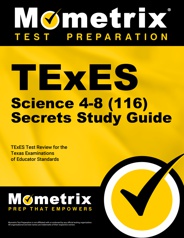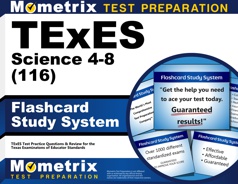The Texas Examinations of Educator Standards (TExES) Science 4-8 exam is used to assess the skills and knowledge of prospective entry-level Science teachers for 4th-8th graders in Texas public schools.
Click “Start Test” above to take a free TExES Science 4-8 practice test, and check out our premium-quality TExES test prep resources by clicking the links below!
TExES Science 4-8 Exam Outline
The TExES Science 4-8 exam contains a total of 100 selected-response questions, and you will be given 4 hours and 45 minutes to complete it.
Teaching Standards
The exam is aligned with the 11 standards for educators that have been outlined by the State Board for Educator Certification.
Click the button below to see the full list of approved educator standards:
Approved Educator Standards
Standard I: You are expected to manage the classroom, field, and lab activities to ensure student safety and the ethical care and treatment of specimens and organisms.
Standard II: You are expected to understand how to use materials, technologies, equipment, and tools correctly.
Standard III: You are expected to understand scientific inquiry and its role in science instruction.
Standard IV: You are expected to have practical and theoretical knowledge about teaching science and how students learn science.
Standard V: You are expected to know the appropriate assessments to monitor the learning of science.
Standard VI: You are expected to understand the history and nature of science.
Standard VII: You are expected to understand how science affects daily life and how science interacts with societal and personal decisions.
Standard VIII: You are expected to understand the science content appropriate to teach physical science in the state of Texas.
Standard IX: You are expected to understand the science content appropriate to teach life science in the state of Texas.
Standard X: You are expected to understand the science content appropriate to teach Earth and space science in the state of Texas.
Standard XI: You are expected to know the unifying processes and concepts that are common among all sciences.
Exam Domains
The exam is split into six domains, each of which covers one or more of the 11 standards mentioned above.
| Domain | Percentage of Exam | Standards Used |
|---|---|---|
| 1. Scientific Inquiry and Processes | 22% | I-III, VI, VII, and XI |
| 2. Physical Science | 22% | VIII |
| 3. Life Science | 22% | IX |
| 4. Earth and Space Science | 22% | X |
| 5. Science Learning, Instruction, and Assessment | 13% | III-V |
For the questions in this domain, you will be asked to demonstrate your knowledge and abilities in the following areas:
- The nature of science
- The process of scientific inquiry
- Selecting and managing learning activities to ensure student safety
- Correctly caring for and using natural resources, materials, technologies, organisms, and equipment
- Unifying concepts that are common among all sciences
- The history of science
- The interactions and influences of science on societal and personal decisions
- The impact of science on daily life
2. Physical Science
For the questions in this domain, you will be asked to demonstrate your knowledge and abilities in the following areas:
- Forces and motion
- Physical properties of matter
- Changes in matter
- Interactions between energy and matter
- Energy transformations
- Conservation of matter and energy
3. Life Science
For the questions in this domain, you will be asked to demonstrate your knowledge and abilities in the following areas:
- The structure and functions of living things
- Reproduction
- The mechanisms of heredity
- The theory of evolution
- Relationships between the environment and organisms
4. Earth and Space Science
For the questions in this domain, you will be asked to demonstrate your knowledge and abilities in the following areas:
- The structure and functions of Earth systems
- Earth system cycles
- The role of energy in climate and weather
- Characteristics of the universe
- Characteristics of the solar system
- History of the Earth system
5. Science Learning, Instruction, and Assessment
For the questions in this domain, you will be asked to demonstrate your knowledge and abilities in the following areas:
- Monitoring and assessing science learning in classroom, lab, and field settings
- Research-based practical and theoretical knowledge about teaching science
- The role of scientific inquiry in science instruction
Check Out Mometrix's TExES Science 4-8 Study Guide
Get practice questions, video tutorials, and detailed study lessons
Get Your Study Guide
TExES Science 4-8 Exam Registration
To register for the Science 4-8 exam, you must create an online NES account via their website. Once your account has been created, you can use it to register for the exam and schedule an exam date.
When you register, you will need to pay the $116 examination fee.
How to Study for the TExES Science 4-8 Exam
Think you aren’t a good test-taker? Maybe on a study-time crunch? Or just don’t know how to begin studying? Mometrix has designed a new Study Secrets course to help every student, no matter what study scenario you are in. Here’s what you’ll find in the Study Secrets Course:
- Techniques to Conquer Procrastination
- Steps to building a Study Plan custom to your learning style
- 7 Effective Note-Taking Methods
- Test-Taking Tips
- Memory Techniques and Mnemonics
- And much more!
Everyone learns differently, so we’ve tailored our Study Secrets Course to ensure every learner has what they need to prepare for their upcoming exam or semester. Click below to check it out!
Test Day
You should arrive at the testing center 30 minutes before your scheduled appointment to allow enough time for the check-in process. Once you arrive, you will be asked to sign in and present one form of valid, government-issued photo ID.
After the check-in process, you will be asked to leave all personal items (phone, keys, wallet, etc.) in a locker outside the testing area.
Once you enter the testing room, you will be asked to sign an NDA, and you will be given a brief tutorial on the computer-adaptive testing system. Once the tutorial is complete, the exam will begin.
How the TExES Science 4-8 Exam is Scored
The TExES Science 4-8 exam is computer-adaptive. Here’s a look at how it works:
The first question is judged to be of medium difficulty, and depending on your performance, the next question may be easier or harder. If you do well on the first question, the second question will be harder; conversely, if you do poorly on the first question, the second question will be easy.
The questions on this exam are rated on a scale of 100-300. The higher a question is rated, the harder the question is (e.g., a question marked as 268 will be more difficult than a question marked 188).
To pass the exam, your final question must be on or above the 240 mark. If your final question is below this mark, you will not pass the exam, even if you have answered some questions above the 240 mark at some point during the exam. This is because the computer has rated the difficulty of your final question based on how you answered the previous questions.
Check Out Mometrix's TExES Science 4-8 Flashcards
Get complex subjects broken down into easily understandable concepts
Get Your Flashcards
FAQs
Q
How many questions are on the TExES Science 4-8 exam?
A
There are 100 selected-response questions on the exam.
Q
How long is the TExES Science 4-8 exam?
A
The time limit for the exam is 4 hours and 45 minutes.
Q
What is the passing score for the TExES Science 4-8 exam?
A
To pass the exam, you must achieve a scaled score of at least 240.
Q
How much does the TExES Science 4-8 exam cost?
A
The examination fee is $116.


